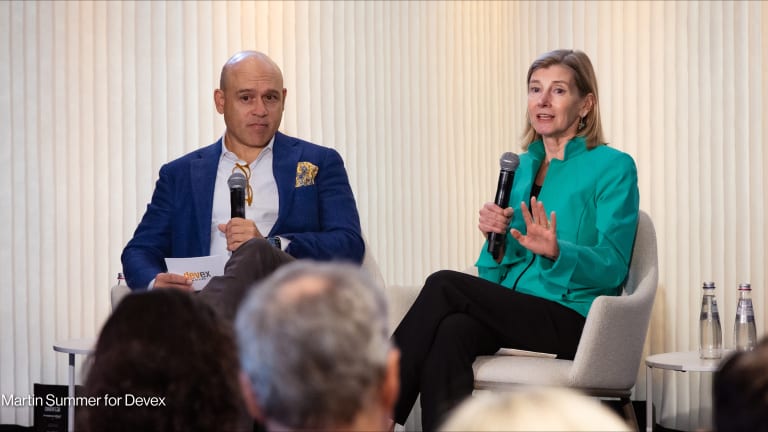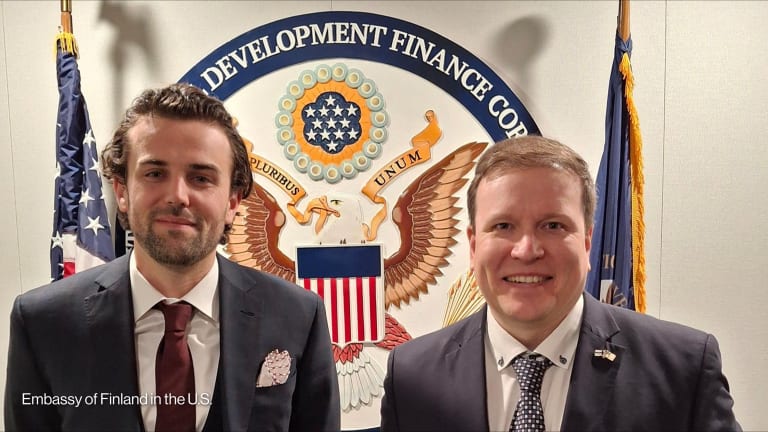How new chief's people-centered approach can drive change at VSO
After months of searching, VSO International finally found its new CEO in Philip Goodwin, a development veteran whose main task will be to oversee the implementation of the aid organization's People First strategy. How does he plan to do that? A Devex exclusive interview.
The Voluntary Services Overseas International has been quietly implementing wide-ranging changes over the past few years. The aid agency has been putting in place measures to diversify its sources of income, and save up where it can. It moved its headquarters from Putney to Kingston (both in southwest London), allowed several staff members to work remotely, and increased its fundraising budget to 10 percent as part of its goal to expand its donor base and reduce reliance on strategic grants coming from the U.K. Department for International Development. The aid agency has also decided to put much of its resources where it believes it can have more impact, opening an office in Myanmar and shutting its doors in Burkina Faso, and lower-middle-income countries Cameroon, Indonesia, Laos, Mongolia and Sri Lanka. And today, after months of searching, it is welcoming new CEO Philip Goodwin, whose portfolio boasts years of experience at the British Council as well as heading U.K.-based charity Tree Aid for the past four years. Goodwin will permanently replace Marg Mayne, who stepped down as CEO in July, and will replace Jim Emerson, who took on the job on an interim basis. Kathryn Gordon, director of people group and organizational development at VSO International, told Devex Goodwin’s main responsibility will be to oversee the proper implementation of the organization’s People First strategy developed in 2010. “His key task will be leading VSO to implement People First well, ensuring that the organization is delivering impact to reduce poverty, by bringing people together, and that VSO does this effectively,” she said. It won’t be an easy job. The strategy calls on VSO to have increased global income amid a tough funding environment, streamline work across more than 25 countries where the aid agency currently has presence, and be more adaptive and flexible in an ever-changing development landscape. But the board, Gordon stressed, is confident Goodwin is up to the task, given his volunteering and leadership experience as well as his approach to achieving impact. In an exclusive interview ahead of officially taking the helm at VSO, Goodwin talks more about his new role, his people-centered approach and his idea of a more stable financing for VSO. You co-authored a book in 2008 titled, “From Hippos to Gazelles: How Leaders Create Leaders.” Which lessons would you most put into practice in your new role at VSO? One important thing I talked about in the book is begin with what works. I think a lot of leaders come to organizations spotting all the problems. Actually, spotting the problem is the easiest thing to do. But actually trying to work out what works, and what works effectively, so what in the jargon is called appreciative inquiries, [is harder, but] something which I found very, very powerful. It’s very motivating for people in terms of changing. If you already recognize what people already do well on, say, “OK that’s great. So how can we build on that?” That opens people up to the possibility of a change and building a future. So that’s something I found very useful in the past, and something which I think what will help me here at VSO. People want to be motivated. And I say one of the most motivating things is when people are recognized and valued. I think the other thing is, as leaders, you have to be really clear about things. Often leaders want to give instructions and give direction. But they are not necessarily very good at hearing what comes back from the teams that they work with. Now to me the very best leaders, they make a call to their teams, but they also work with the response. So when the response comes back, they consider that and reflect upon it, and actively engage with their teams. How do you see these concepts working with VSO? Well I suppose there’s this idea that if you employ people, you can compel them to do something. Actually if anyone has tried to lead teams, it’s actually quite difficult to compel anyone to do anything. Everyone volunteers their time and their ideas, whether they are paid or not. So essentially I think it’s the same thing. What motivates people? What inspires them? What energizes them? A lot of that is about valuing them, about uncovering what their potential is, and about supporting that. Have you tried these at Tree Aid? What lessons have you learned from that experience? There’s always things you learn, and things you do differently. And I suppose there’s no blueprint. I think that ultimately, you’ve got to work with what you’ve got in front of you. I think there are certain principles, and I think that they apply both across Tree Aid and VSO. I think one of the challenges, in Tree Aid for example, everyone always thinks they don’t have enough resource. Everywhere I work, big or small organizations, no one thinks they have the resource in front of them. And you’re trying to unlock the resource, which is normally the experience and skills and ideas of people, is one of the most important things you can do. I think that’s certainly something I’ve seen at Tree Aid. Can we expect more changes coming under your leadership? It’s inevitable, if I can be honest. In the 21st century, the world is changing so, so, so quickly. So if you’re an organization that is focused on its mission, which is placed in the outside world, then it is inevitable that change will happen. So the really great organizations are ones that have that indoor flexibility within them. So if anything I suppose under my leadership, is making sure people have the confidence and skills to be able to make changes without suffering. Because often people think that change is really about suffering. It’s about being forced into something that they don’t want to do. And really for me the challenge is to create conditions in which people are comfortable and confident to embrace change. Often leaders want to give instructions and give direction. But they are not necessarily very good at hearing what comes back from the teams that they work with. --— Philip Goodwin, CEO of VSO International The people we’re helping, which [are] the poorest in the world, need us to constantly change and respond to their realities, not the way we expect to see the world. So my job is to ensure that our team across VSO who are passionate about delivering that change on the ground, have the confidence and the capacity to do that so they don’t feel as though … that change is something to be frightened of [but rather] something that helps them to do what they feel passionate about. Fundraising is one of the focuses of the organization now. What ideas do you think you can bring in in terms of fundraising? You know that fundraising is really tough. Marg correctly identified it as a priority, and it will certainly be a priority for me as chief executive. But I think it’s around the diversification of funds. If you look at how VSO has done on its funding over the last few years, and it’s been very successful in terms of its usual fundraising, [but] if you look at individual giving, which is I think what you’re referring to, that is a tough, tough working environment. We know individual giving has seen significant reductions over the last five, six years, generally. Certainly VSO would want to continue investing in the area, but it wants to continue to invest in fundraising across the board, and not just on restricted [funding]. And it’s important it has a balanced portfolio in that sense. I think it’s important to diversify funding. But I think the big bilateral donors will continue to be major funders of iNGO work for the foreseeable future. With Tree Aid, I was very active in building a social enterprise component of what Tree Aid did, so there we started our own nonprofit business, but delivering on core mission. Now it’s too early to say how does that fit with what VSO do, but I always think it’s worth looking at that. But anything built on social enterprise should be built on core mission. What I’m not so keen on is when a social enterprise is built up purely as a mechanism to raise funds, but actually the mechanism doesn’t do anything with the core mission. The risk is then it becomes a distraction. Now with VSO I don’t know where that opportunity might lie, but it is certainly worth exploring. But actually in terms of the funding now, we know there’s huge interest in what is delivered through volunteering. VSO’s got a report coming out in March on valuing volunteering, showing the impact of volunteering, for international development. And I think in some ways, in the past, organizations have underplayed or not gone out enough to show and demonstrate with evidence as VSO is doing now, the impact that volunteering has, and the value for money it delivers in those terms, in terms of development outcomes. But I think there’s still a long way to go actually in terms of funding, so I certainly wouldn’t turn my back on DfID or [U.S. Agency for International Development] or anyone else. Check out more insights and analysis for global development leaders like you, and sign up as an Executive Member to receive the information you need for your organization to thrive.
The Voluntary Services Overseas International has been quietly implementing wide-ranging changes over the past few years.
The aid agency has been putting in place measures to diversify its sources of income, and save up where it can. It moved its headquarters from Putney to Kingston (both in southwest London), allowed several staff members to work remotely, and increased its fundraising budget to 10 percent as part of its goal to expand its donor base and reduce reliance on strategic grants coming from the U.K. Department for International Development.
The aid agency has also decided to put much of its resources where it believes it can have more impact, opening an office in Myanmar and shutting its doors in Burkina Faso, and lower-middle-income countries Cameroon, Indonesia, Laos, Mongolia and Sri Lanka.
This story is forDevex Promembers
Unlock this story now with a 15-day free trial of Devex Pro.
With a Devex Pro subscription you'll get access to deeper analysis and exclusive insights from our reporters and analysts.
Start my free trialRequest a group subscription Printing articles to share with others is a breach of our terms and conditions and copyright policy. Please use the sharing options on the left side of the article. Devex Pro members may share up to 10 articles per month using the Pro share tool ( ).
Jenny Lei Ravelo is a Devex Senior Reporter based in Manila. She covers global health, with a particular focus on the World Health Organization, and other development and humanitarian aid trends in Asia Pacific. Prior to Devex, she wrote for ABS-CBN, one of the largest broadcasting networks in the Philippines, and was a copy editor for various international scientific journals. She received her journalism degree from the University of Santo Tomas.








